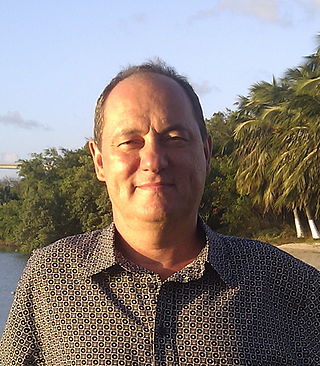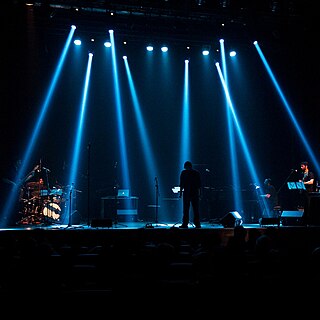Related Research Articles

Simulink is a MATLAB-based graphical programming environment for modeling, simulating and analyzing multidomain dynamical systems. Its primary interface is a graphical block diagramming tool and a customizable set of block libraries. It offers tight integration with the rest of the MATLAB environment and can either drive MATLAB or be scripted from it. Simulink is widely used in automatic control and digital signal processing for multidomain simulation and model-based design.
A hybrid system is a dynamical system that exhibits both continuous and discrete dynamic behavior – a system that can both flow and jump. Often, the term "hybrid dynamical system" is used, to distinguish over hybrid systems such as those that combine neural nets and fuzzy logic, or electrical and mechanical drivelines. A hybrid system has the benefit of encompassing a larger class of systems within its structure, allowing for more flexibility in modeling dynamic phenomena.

The National Technological University is a country-wide national university in Argentina, and considered to be among the top engineering schools in the country. Hosting over 85,000 students, its student body is comparable to Argentina's third-largest university and exceeded significantly only by the University of Buenos Aires (UBA). It has 29 semi-independent branches of various sizes located all over the country.

The National University of Rosario is a research public university located in the city of Rosario, province of Santa Fe, Argentina.

The following is an alphabetical list of topics related to the Argentina.
DEVS, abbreviating Discrete Event System Specification, is a modular and hierarchical formalism for modeling and analyzing general systems that can be discrete event systems which might be described by state transition tables, and continuous state systems which might be described by differential equations, and hybrid continuous state and discrete event systems. DEVS is a timed event system.

Ricardo Ernesto Montes i Bradley, poet, essayist, art historian, and literary critic and diplomat born on June 9, 1905, in Rosario, Argentina. He was Honorary Consul of México in Rosario, professor of Fine Arts, publisher, columnist and contributor in newspapers and literary magazines in Latin America. R-E Montes i Bradley held Doctorates in the Law, Diplomacy, History and International Law. He was an active member of the International Institute of Ibero-American Literature and the International Association of Critics; Correspondent Member of the National Academy of Arts and Literature of Cuba and of the National Academy of History and Geography of Mexico; Honorary Member of the Mexican Academy of Genealogy and Heraldry ; member of the Sociedad Argentina de Escritores (SADE); a member of the Círculo de la Prensa and the Colegio de Abogados de la Ciudad de Rosario; co-founded the Escuela de Bellas Artes de Rosario; member of the Asociación de Críticos de México. As publisher, he was responsible for the Boletín de Cultura Intelectual, which he also directed; the art magazines Revista Paraná and Cuadernos del Litoral were also the result of his commitment to journalism in the arts. The last two publications were dedicated to promote the works of local artist, writers, poets in the region known as Paraná, Rosario de Santa Fe and vicinity.
Specialized wind energy software applications aid in the development and operation of wind farms.
The term Engineering Informatics may be related to information engineering, computer engineering, or computational engineering, among other meanings. This word is used with different context in different countries. In general, some people assume that the central area of interest in informatics is information processing within man-made artificial (engineering) systems, called also computational or computer systems. The focus on artificial systems separates informatics from psychology and cognitive science, which focus on information processing within natural systems. However, nowadays these fields have areas where they overlap, e.g. in field of affective computing.

Enrico Francesco Leopoldo "Enrique" Ferrarese was an Italian Argentine real estate developer.

Juan Pavón is a Spanish computer scientist, full professor of the Complutense University of Madrid (UCM). He is a pioneer researcher in the field of Software Agents, co-creator of the FIPA MESSAGE and INGENIAS methodologies, and founder and director of the research group GRASIA: GRoup of Agent-based, Social and Interdisciplinary Applications at UCM. He is known for his work in the field of Artificial Intelligence, specifically in agent-oriented software engineering. He has been often cited by mainstream media, as a reference in Artificial Intelligence.
Simcenter Amesim is a commercial simulation software for the modeling and analysis of multi-domain systems. It is part of systems engineering domain and falls into the mechatronic engineering field.
The quantized state systems (QSS) methods are a family of numerical integration solvers based on the idea of state quantization, dual to the traditional idea of time discretization. Unlike traditional numerical solution methods, which approach the problem by discretizing time and solving for the next (real-valued) state at each successive time step, QSS methods keep time as a continuous entity and instead quantize the system's state, instead solving for the time at which the state deviates from its quantized value by a quantum.

Bernard P. Zeigler is a Canadian-born engineer, and Professor Emeritus of Electrical and Computer Engineering at the University of Arizona. Zeigler is a notable figure in the field of advanced modelling and simulation, known for inventing Discrete Event System Specification (DEVS) in 1976. Zeigler is also Chief Scientist at RTSync, a company with expertise in the commercial applications of DEVS, and specializations in Model-Based System Engineering (MSBE), Predictive Analytics, and Machine Learning technology.
PragmaDev Studio is a modeling and testing software tool introduced by PragmaDev in 2002 dedicated to the specification of communicating systems. It was initially called Real Time Developer Studio or RTDS. Its primary objective was to support SDL-RT modeling technology. Since V5.0 launched on October 7, 2015 RTDS is called PragmaDev Studio, and it is organized in four independent modules: Specifier, Developer, Tester and Tracer. V5.1 launched on November 29, 2016 introduces a freemium licensing model.

José Manuel Corral is a lawyer, a political activist of the Radical Civic Union and a member of Cambiemos. He was Mayor of Santa Fe for eight years.

The Ensamble Nacional del Sur (ENS) is an electro-acoustic ensemble located in Buenos Aires, which specialises in contemporary classical music.

NL5 is a mixed-signal electronic circuit simulator with ideal and piecewise-linear components.

Federico Rodríguez Hertz is an Argentine mathematician working in the United States. He is the Anatole Katok Chair professor of mathematics at Penn State University. Rodriguez Hertz studies dynamical systems and ergodic theory, which can be used to described chaos's behaviors over the large time scale and also has many applications in statistical mechanics, number theory, and geometry.
References
- [CK06] Francois E. Cellier & Ernesto Kofman (2006). Continuous System Simulation (first ed.). Springer. ISBN 978-0-387-26102-7.
- [Zeigler76] Bernard Zeigler (1976). Theory of Modeling and Simulation (first ed.). Wiley Interscience, New York.
- [BK11] Bergero, Federico & Kofman, Ernesto (2011). "PowerDEVS: a tool for hybrid system modeling and real-time simulation" (first ed.). Society for Computer Simulation International, San Diego.